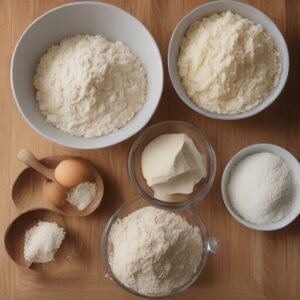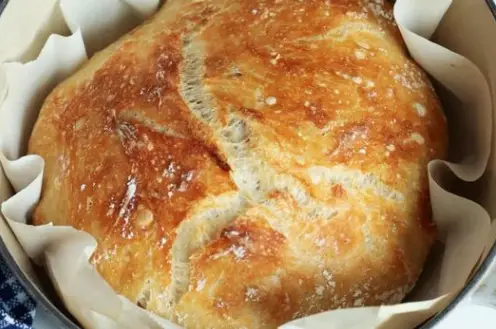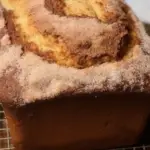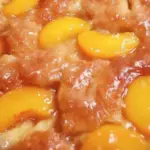Welcome to the world of bread-making simplicity! No-knead bread is a game-changer for home bakers, offering artisan-quality loaves with minimal effort. Whether you’re a seasoned baker or a novice in the kitchen, this recipe will guide you through creating rustic, crusty bread that’s sure to impress. Say goodbye to laborious kneading and hello to a hands-off approach that yields incredible results.
Ingredients:
- 3 cups all-purpose flour
- 1/2 teaspoon active dry yeast
- 1 1/2 teaspoons salt
- 1 1/2 cups warm water (approximately 110°F)
Instructions:
- Mixing: In a large mixing bowl, combine the flour, yeast, and salt. Stir to evenly distribute the ingredients.
- Adding Water: Pour the warm water into the bowl, stirring until a shaggy dough forms. Don’t worry about achieving a perfectly smooth consistency; a slightly rough texture is what we’re aiming for.
- Resting: Cover the bowl with plastic wrap or a clean kitchen towel and let the dough rest at room temperature for 12 to 18 hours. During this time, the yeast will work its magic, fermenting the dough and developing its flavor.
- Preheating: After the resting period, preheat your oven to 450°F (230°C). Place a Dutch oven or heavy oven-safe pot with a lid into the oven as it preheats.
- Shaping: While the oven heats up, lightly flour a work surface and your hands. Gently shape the dough into a ball or oval, being careful not to deflate it too much. You can also fold the dough over itself a couple of times to enhance its structure.
- Baking: Carefully remove the preheated pot from the oven and place the dough inside. Cover with the lid and bake for 30 minutes.
- Uncovering: After 30 minutes, remove the lid from the pot and continue baking for an additional 15-20 minutes, or until the bread is golden brown and sounds hollow when tapped on the bottom.
- Cooling: Once baked, transfer the bread to a wire rack to cool completely before slicing. Enjoy the aroma and anticipation as your kitchen fills with the scent of freshly baked bread!
Cook Notes and Variations:
- Flour Variations: Feel free to experiment with different types of flour, such as whole wheat, rye, or bread flour, for unique flavors and textures.
- Adding Seeds or Herbs: Enhance your bread’s flavor by incorporating seeds (like sesame, poppy, or sunflower seeds) or herbs (such as rosemary or thyme) into the dough before baking.
- Sweet or Savory: Adjust the flavor profile of your bread by adding a touch of sweetness with honey or sugar, or go savory with garlic powder, cheese, or olives.
- Texture Tweaks: For a chewier crust, increase the baking time with the lid on or bake at a slightly lower temperature. Alternatively, for a softer crust, bake at a higher temperature for a shorter duration.
Keto and Low Carb Versions:
- Keto Option: Substitute almond flour or coconut flour for the all-purpose flour to reduce the carb content. Keep in mind that keto flours absorb moisture differently, so you may need to adjust the amount of water accordingly.
- Low Carb Variation: Incorporate vital wheat gluten into the dough to boost its protein content and mimic the structure of traditional bread while keeping the carbs low.
Frequently Asked Questions (FAQs):
- Can I use instant yeast instead of active dry yeast?
- Yes, you can substitute instant yeast for active dry yeast in equal amounts. However, since instant yeast doesn’t require proofing, you can mix it directly with the flour.
- What if I don’t have a Dutch oven?
- While a Dutch oven produces excellent results, you can use any heavy, oven-safe pot with a lid. Alternatively, shape the dough into a boule and bake it on a preheated baking stone or sheet pan.
- Can I refrigerate the dough for longer fermentation?
- Yes, you can refrigerate the dough for up to 24-48 hours for a longer fermentation period. This allows for deeper flavor development and can be convenient for fitting baking into your schedule.
- How do I store leftover bread?
- To maintain freshness, store cooled bread in a paper bag or loosely wrapped in a clean kitchen towel. Avoid storing bread in plastic bags, as they can trap moisture and lead to sogginess.

No-knead bread is a testament to the beauty of simplicity in baking. With just a handful of ingredients and a bit of patience, you can create homemade bread that rivals that of artisan bakeries. Whether you’re craving a classic loaf or eager to experiment with flavors and textures, this recipe serves as a versatile foundation for your bread-making adventures. So roll up your sleeves (or not, in this case), and let the aroma of freshly baked bread fill your kitchen!
Happy baking!


